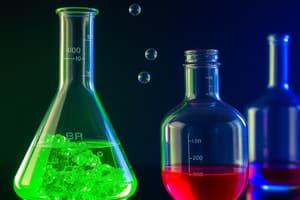Podcast
Questions and Answers
What type of change is described by the term 'physical change'?
What type of change is described by the term 'physical change'?
- A change that alters the form of a substance but not its chemical composition (correct)
- A change that results in the formation of new substances
- Both A and B
- None of the above
What type of change is described by the term 'chemical change'?
What type of change is described by the term 'chemical change'?
- A change that alters the form of a substance but not its chemical composition
- A change that results in the formation of new substances (correct)
- Both A and B
- None of the above
What is a physical change?
What is a physical change?
A change that affects one or more physical properties, but does not change the chemical composition.
What is a chemical change?
What is a chemical change?
Flashcards are hidden until you start studying
Study Notes
Physical Change
- Involves alterations in physical properties without changing the substance's chemical structure.
- Common examples include melting, freezing, boiling, and dissolving.
- Characteristics such as shape, size, color, mass, and volume are affected, but the composition remains the same.
- Reversible processes like freezing water into ice and then melting back to water.
Chemical Change
- Entails a transformation in the chemical composition of a substance, resulting in the formation of new substances.
- Indicators include color change, gas production, formation of a precipitate, or temperature change.
- Examples include rusting of iron, combustion of gasoline, and digestion of food.
- Generally irreversible, as new products are formed and the original materials cannot be easily recovered.
Key Differences
- Physical changes can often be reversed; chemical changes usually cannot.
- Chemical changes involve the breaking and forming of bonds, altering the chemical identity of the substance.
Studying That Suits You
Use AI to generate personalized quizzes and flashcards to suit your learning preferences.




